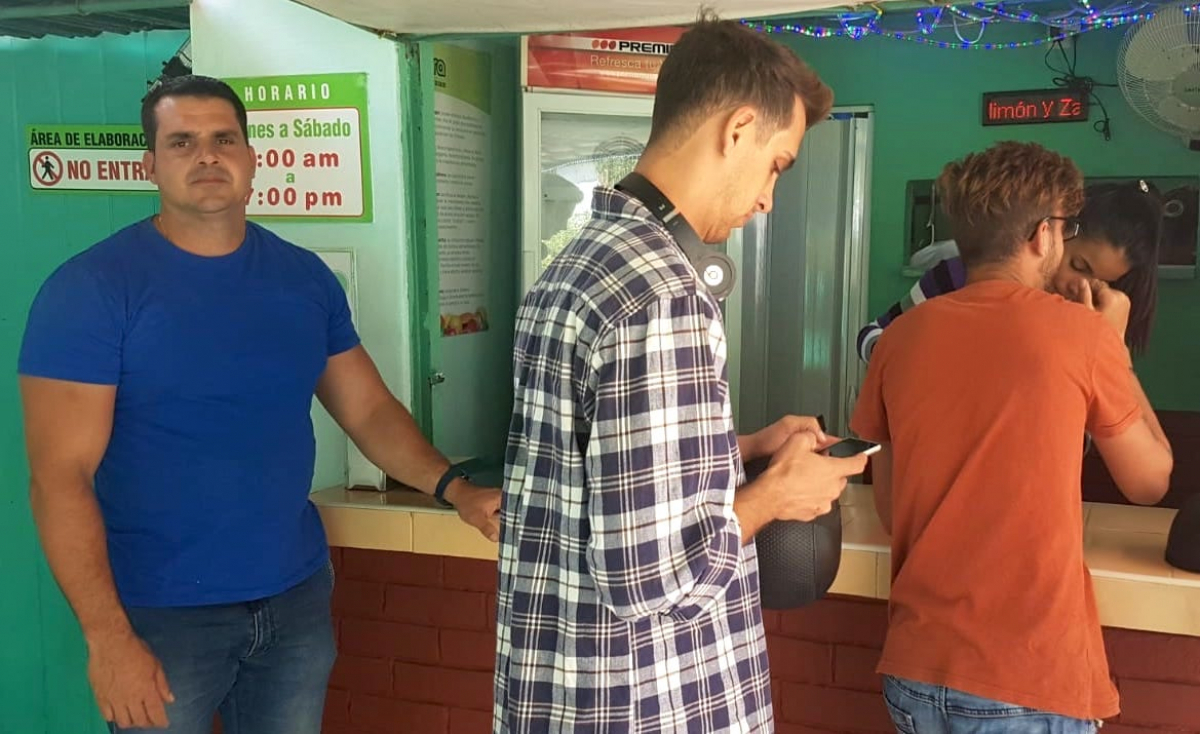To try the entire selection at La Juguera on 3rd and 6th in Havana's Vedado district, you would have to go for two months in a row, every day except Sunday, and order two types of juices. There are 125 fruit juices, vegetables, combinations of fruits, and fruit and vegetable combinations.
I used to say that La Juguera on 3rd and 6th offered one of the best deals in the capital, until a friend told me, very seriously: "It's not one of the best, it's the best in all of Havana."
The juices are prepared with fresh fruits and vegetables purchased daily. Early in the morning the production of the staple juices (papaya, guava, orange, etc.) begins, to open at 9:00 AM with a stock that is replenished as it runs out.
None of the juices are more than three hours old when you order them, the combinations are prepared by customers' requests, and they may be sweetened with sugar or honey, or not at all.
There is nothing similar at state establishments, or at private cafes, or those for tourists, where such juices can cost between one and three CUC.
At La Juguera you can enjoy them for between 3 and 15 Cuban pesos. The most expensive are the combinations containing strawberries, whose availability depends on the season and their current price.
How can such a business remain afloat for six years, in a country where fruit is regularly scarce and often expensive?
Alberto Puig Santiesteban, 39, a Law graduate and owner of La Juguera, explains that this price/quality relationship "sometimes is not a direct function of expenses and the price of the products, but rather, fundamentally, respect for the customer."
"Our strategy is to have a diversity of products. The cost of some may be higher, generating losses, such that they are not profitable. But the product's price remains stable, with a view to the customer enjoying it and not losing faith in our business," he says.
"The loss is offset by the return on another product. Or when the prices of these supplies stabilize and the regular profit is generated again. Our earnings are minimal, depending on demand. The more demand we have, the more profits."
Alberto confesses that some days, after covering his workers' salaries (eight, divided into two crews), and taxes, and electricity, he does not make any profit, and must curtail his personal expenses accordingly. Nevertheless, he considers his business successful.
"For me, success is not defined from a commercial point of view, but by customer satisfaction," he says.
He says that he does not get wealthy off La Juguera, nor is this his intention. Even when there are days when there are no profits, at 3rd and 6th he does not charge pregnant women, children under three years of age, the elderly or disabled, or those who, despite his economical prices, cannot afford a juice. Alberto does not consider this an expense, but a moral and social duty.
"When we see people counting their money and looking for the cheapest juice, we decide not to charge them. Of course, there are people who are sincere about this, and others who aren't. So we must have a critical eye," he says.
Several of the combinations offered at 3rd and 6th were created there, applying the principles of fruit therapy and harvesting, which Alberto has studied for many years; for example, the house juice: coconut lemonade with peppermint, and its B100.
"More than a juice, B100 is a natural food and dietary supplement. It is made with spinach, parsley, celery, ginger, carrot, beet, basil, lemon, banana and orange. The aim is to satisfy all the customer’s vitamin and mineral needs in a single glass. We don't want La Juguera to be just a place to quench your thirst, or enjoy a different flavour. The idea is to help prevent diseases, or to offer a palliative in the face of a pathology. "
Alberto offers recommendations for hypertension, stomach ulcers, and problems assimilating iron.
"For ulcers and gastritis we recommend melon juice with papaya. For hypertension, citrus. In fact, I recommend an ounce and a half or two of lemon juice daily, on an empty stomach. Citrus fruits should be consumed before 12 PM, because later they can cause gastric problems. For iron, parsley and beets are widely used. B100 is ideal for achieving proper iron levels and increasing those of red blood cells. We also recommend it for pregnant women. "
One of the greatest hurdles when starting a private business in Cuba is investment. Alberto started with minimum funds. "In 2013, I was the buyer, the producer, and the clerk, with 15 types of juices. I slept about two hours a day. ”
"In six years I have had maybe 15 days off. With the increase in income I was able to hire a worker, expand our processing capacity, and upgrade the place."
Today it has small tables at which customers can stand, and benches with priority seating for the elderly, disabled, and pregnant women. In the past six years he has learned to repair broken blenders, which saves him money. His greatest struggle has been his workforce.
"When there are problems, customers don't appreciate the same person being there, but rather a demonstration of concern, and the person being changed, to maintain the standard of quality."
He takes pride in the healthy atmosphere at La Juguera, where smoking is not allowed, nor alcohol, nor speaking loudly. But he is not satisfied. His plan is to ensure the business's stability, and improve the conditions for customers.
